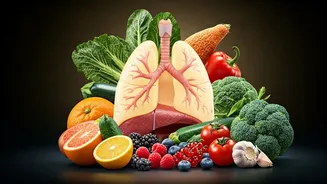Food Group Overview
The insights provided stem from the expertise of a cancer surgeon who emphasizes the impact of dietary choices on lung health, particularly in areas with
high pollution levels. The central argument is that certain food groups have properties that could help mitigate the risks associated with lung cancer. These food groups are not presented as a cure, but as potential allies in the fight against this disease. The recommendations are straightforward and easy to understand. By integrating these food groups into one's daily routine, individuals can take a proactive approach to their well-being. It is a proactive step toward health, considering the challenging environmental conditions that many people face daily. Ultimately, the focus is on providing practical, implementable advice that could have a positive impact on lung health.
Cruciferous Vegetables
Cruciferous vegetables, such as broccoli, cauliflower, cabbage, and kale, are highlighted for their significant role in promoting lung health. These vegetables are rich in compounds like sulforaphane, which have been studied for their ability to combat cancer. Sulforaphane has shown potential in helping to detoxify the body and protect cells from damage. The surgeon's advice underscores the importance of regularly including these vegetables in meals, whether steamed, roasted, or raw. Adding cruciferous vegetables to meals can be a great step towards protecting the lungs. These vegetables are easily found in local markets, making them readily accessible for most people. The emphasis is placed on simple changes in eating habits that have the potential to make a big difference in overall health.
Leafy Green Vegetables
The second food group recommended is leafy green vegetables, which encompasses spinach, lettuce, and collard greens. These greens are packed with vitamins, minerals, and antioxidants, all of which are essential for maintaining optimal lung function. Antioxidants are particularly important as they help neutralize free radicals, which are harmful molecules that can damage cells. By consuming leafy green vegetables, individuals can support their body's natural defenses against potential threats, including pollution-related damage. The message is simple: eating a variety of leafy greens on a regular basis is a step towards better lung health. Incorporating these into daily meals will help people to get essential nutrients and to stay in a better state of health.
Berries and Fruits
Berries and fruits make the third food group. Berries, like blueberries, strawberries, and raspberries, are renowned for their high antioxidant content, crucial for fighting cell damage. Fruits such as oranges and grapefruits are sources of vitamin C, an essential vitamin. Vitamin C further helps with the immune system's function and overall well-being. The advice focuses on integrating these naturally sweet and nutritious options into meals and snacks. From breakfast smoothies to dessert additions, fruits offer a tasty way to support lung health. Consuming berries and other fruits is a pleasant way to boost your immune system and take care of your health.
Tomatoes and Carrots
Tomatoes and carrots form another important food group due to their high levels of lycopene and beta-carotene. Lycopene, a powerful antioxidant, has been researched for its potential cancer-fighting properties. Beta-carotene is converted into vitamin A in the body, which is important for cell growth. The surgeon's guidance suggests including these vegetables in meals through various methods such as salads, cooked dishes, and juices. This makes it easier for people to integrate these beneficial foods into their daily diets. These vegetables are not just nutritious; they are also adaptable to a wide range of recipes and tastes, making it easier to enjoy their benefits regularly.
Healthy Fats
Healthy fats, the fifth food group, are a crucial element in the diet for overall health and cancer prevention. Foods like avocados, nuts, and olive oil contain monounsaturated and polyunsaturated fats. These fats are linked with reduced inflammation and promote cellular health. The surgeon stresses choosing healthy fats over saturated and trans fats to optimize lung health and general well-being. A diet high in healthy fats helps reduce the risk of many diseases. This simple suggestion highlights the significance of food choices and how they can affect health.
Whole Grains
The final food group recommended is whole grains, which include foods like brown rice, oats, and quinoa. These grains are rich in fiber, which is important for overall health, and offer sustained energy release. Whole grains have been linked to a reduced risk of certain cancers. The emphasis is on prioritizing whole grains over refined grains to benefit from their full nutritional value. A diet including whole grains can support not only lung health but also overall health. Making simple changes in food choices will improve your well-being.














